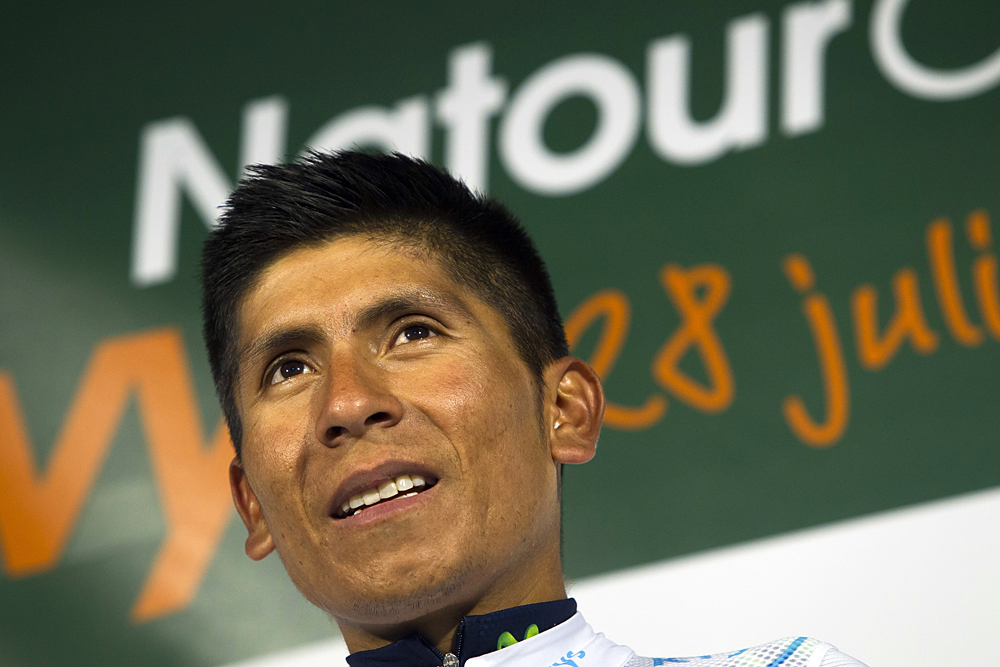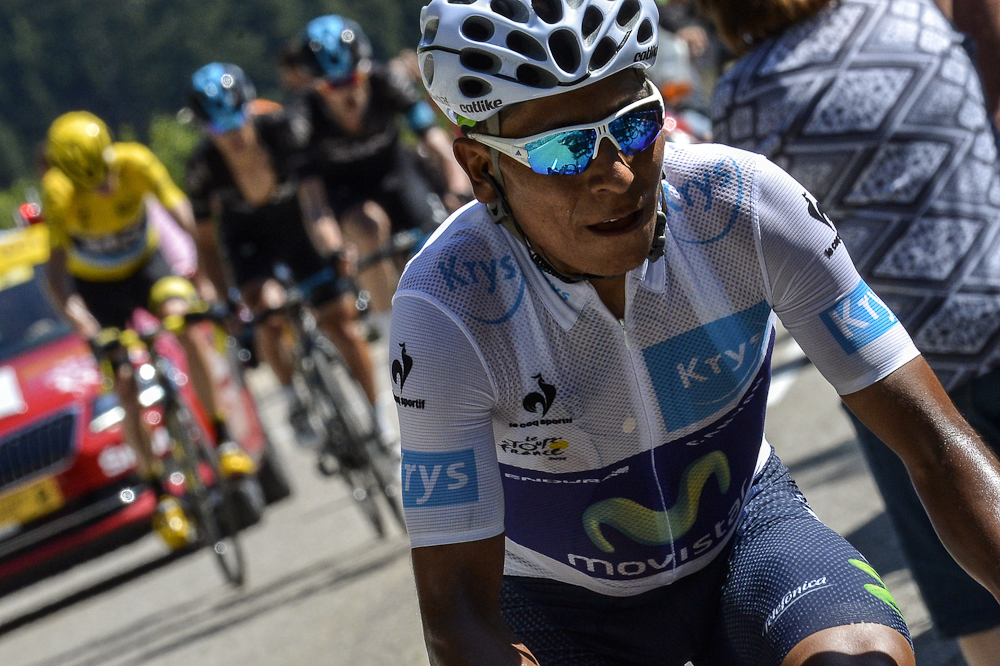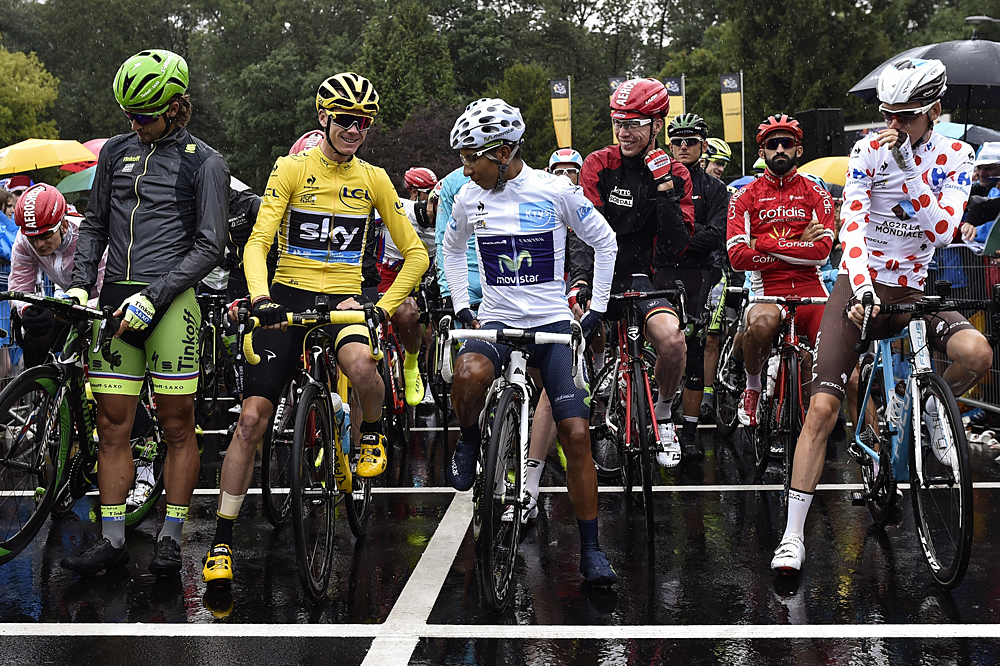Quintana: I’m not the kid I was in the 2012 Vuelta
Movistar co-leader tackles first Tour-Vuelta double of career



Viewed from 2015, in the countdown to the start of the Vuelta a España, the 2012 edition of the same race must almost feel like another world to Nairo Quintana (Movistar).
Making his debut in a Grand Tour at 22 in his first full year racing for a WorldTour team, Movistar, in the 2012 Vuelta Quintana flew under the media radar until stage 16’s dauntingly difficult summit finish at Cueto Negro, an extension of the already tough, better-known ascent to Pajares in northern Spain.
Suddenly, though, in the stage’s closing kilometres, Quintana found himself in the limelight. As team-mate and leader Alejandro Valverde attempted to shed as many of his rivals as possible, it was Quintana who cranked up the pace in the leading group on the steepest slopes of the climb, prior to finishing sixth himself on the stage, his first top ten mountain finish in a Grand Tour.
Overall, whilst Valverde claimed second in Madrid in 2012, Quintana finished a relatively anonymous 36th. Fast forward three more years and, whilst Valverde has gone from strength to strength, the Colombian has now built up a solid palmarès of Grand Tour results that makes him a very solid overall contender in his own right. There can be no doubt that after his second place this summer in the Tour, Quintana will be looking to put the memories of the 2014 Vuelta - where he crashed out injured after one day in the lead - behind him for good.
“I’m no longer the kid I was in 2012,” Quintana told Spanish website biciciclismo as the Vuelta start approached. “This is my sixth Grand Tour and I have more confidence and more experience.”
“I’ve recovered well from the Tour, and I feel good. The Vuelta is another big challenge, we’re back here in good shape and with a great team and I hope the Vuelta starts well for us. Last year I was in very good condition and unfortunately that crash forced me out of the race.”
Racing the Vuelta and Tour in the same year represents uncharted waters for the 25-year-old, and was understandably wary of sounding over-confident when questioned about the prospect of racing two Grand Tours in three months.
Get The Leadout Newsletter
The latest race content, interviews, features, reviews and expert buying guides, direct to your inbox!
“We’ll have to see how things go, given the Tour was extremely tough and there hasn’t been that much time to recover. For the moment, I’m feeling fine, but I’ll have to see how my body reacts to so many racing days.”
Asked by biciciclismo if he thought he was the favourite, Quintana rejected the idea. Instead the Colombian star repeated he was in good shape and that “we are going to fight hard in this Vuelta. It’s a very tough Vuelta, one with a lot of hard stages and there won’t be a top favourite until we see how everybody’s going in the first few days.”
The number of top names at the Vuelta this year, and the fact many have just race what was widely viewed as a very hard Tour de France, has arguably made Quintana feel even more cautious about throwing down the gauntlet too soon, too.
“All of us [favourites] who did the Tour” - barring Alberto Contador (Tinkoff-Saxo), the defending Vuelta champion - “are here,” Quintana pointed out. But he also underlined that given the deeper level of general fatigue they would be feeling by this point in the season, those riders who had remained in overall contention to the end of the Tour de France would not be as fresh in the Vuelta as “those [favourites] who eased off a little. [in July].”
Given they are both in good shape, the crunch question for Quintana and Valverde - although to date it is one they seem to have settled with no issues whatsoever - is that of how their co-leadership in the Vuelta will work out on a practical level. As level-headed as usual, Quintana argued the results on the road would provide the answer.
“We’re both aiming at the overall, waiting to see who will lose [time] first and [who will then] help the other one,” he said. “We were both in the Tour de France and we don’t know how our bodies will react when we get into the mountains.” But in such a hard Vuelta, with nine summit finishes starting on stage two, it surely won’t be too long before that becomes clear.
To subscribe to the Cyclingnews video channel, click here.
Alasdair Fotheringham has been reporting on cycling since 1991. He has covered every Tour de France since 1992 bar one, as well as numerous other bike races of all shapes and sizes, ranging from the Olympic Games in 2008 to the now sadly defunct Subida a Urkiola hill climb in Spain. As well as working for Cyclingnews, he has also written for The Independent, The Guardian, ProCycling, The Express and Reuters.
